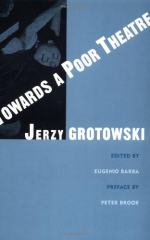
|
| Name: _________________________ | Period: ___________________ |
This quiz consists of 5 multiple choice and 5 short answer questions through The Theatre's New Testament.
Multiple Choice Questions
1. Who developed bio-mechanical training for the actor?
(a) Stanislavski.
(b) Meyerhold.
(c) Brecht.
(d) Beckett.
2. In "The Theatre's New Testament," Grotowski says, "The elaboration of artificiality is a question of _____ - sounds and gestures - which evoke associations in the psyche of the audience."
(a) Archetypes.
(b) Holograms.
(c) Ideograms.
(d) Signals.
3. What does Grotowski compare his work with actors to, as opposed to that of the artist or the scientist in "The Theatre's New Testament"?
(a) Musician.
(b) Shoemaker.
(c) Groomer.
(d) Physician.
4. Who wrote the preface to "Towards a Poor Theatre"?
(a) Peter Brook.
(b) Jerzy Grotowski.
(c) Lans Sosnowski.
(d) Samuel Beckett.
5. How does Grotowski claim to feel when asked, "What is the origin of your experimental theatre productions?"
(a) Eager.
(b) Impatient.
(c) Hesitant.
(d) Happy.
Short Answer Questions
1. Whose work on "physical actions" is incorporated into Grotowski's system?
2. What training techniques of oriental theatre does Grotowski implement?
3. What does Grotowski refer to contemporary theatre, or "synthetic theatre" as in "Towards a Poor Theatre" (Chapter 1)?
4. Whose rhythm exercises does Grotowski find most important?
5. The technique of the "courtesan actor" is _____.
|
This section contains 189 words (approx. 1 page at 300 words per page) |

|




